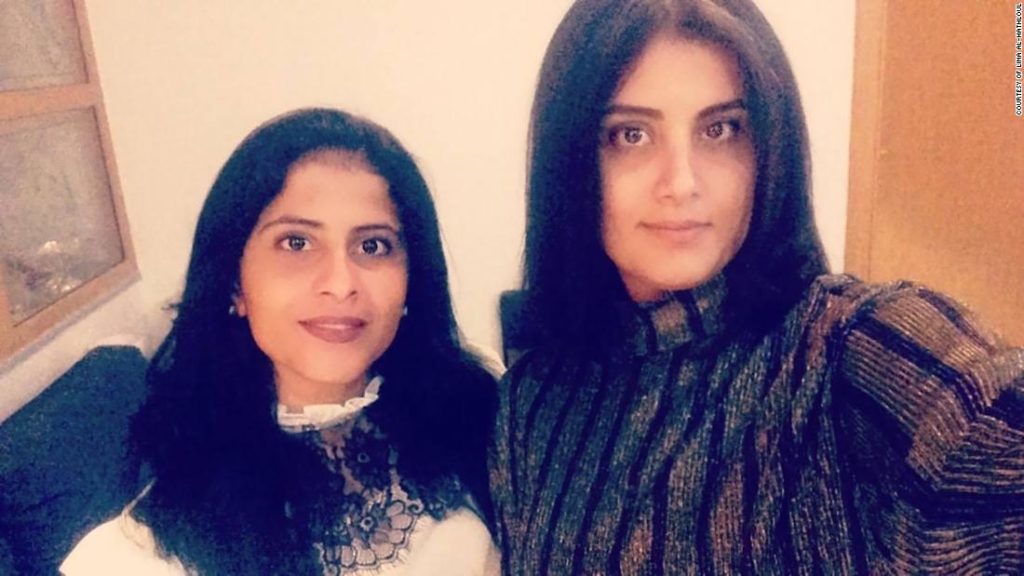Hathloul appeared in a Saudi court on Wednesday, as her trial was scheduled to start after 900 days in pre-trial detention.
The court instead referred the case to the Specialized Criminal Court for terrorism and national security cases, according to a statement from her family and supporters, sent to CNN.
“We remain deeply concerned by the continued detention of at least five women’s right activists in Saudi Arabia. We regret that the cases of Loujain Al-Hathloul and Samar Badawi have now been referred to the Special Criminal Court for terrorism and national security cases,” human rights ambassadors for the UK, Netherlands, Germany, Sweden, Estonia, Luxembourg and Finland said in a statement.
Hathloul, 31, was jailed in May 2018 during a sweep that targeted prominent opponents of the kingdom’s former law barring women from driving. The crackdown happened just weeks before the ban was lifted, casting doubt on a reform agenda put forward by Crown Prince Mohammed bin Salman.
The court she appeared in on Wednesday said it would investigate Hathloul’s allegations of torture in prison, according to the family’s statement. Saudi authorities have repeatedly denied allegations of torture and sexual abuse in their prisons. A new trial date hasn’t been announced yet.
“Peaceful activism, and advocating for women’s rights is not a crime. Human rights defenders can be a strong partner for governments in addressing concerns within society,” the ambassadors said.
“We join the UN High Commissioner for Human Rights, Special Rapporteurs and Treaty Bodies in reiterating our call for the release of all political detainees, including the women’s rights activists.”
CNN has reached out to the Saudi government for a response.
In an interview with CNN’s Nic Robertson earlier this month, Saudi Minister of State for Foreign Affairs Adel Jubeir said Hathloul’s case “was up to the courts” and that “she’s on trial for matters related to national security.”
An Amnesty International representative for the Middle East, Lynn Maalouf, said the Specialized Criminal Court was “an institution used to silence dissent and notorious for issuing lengthy prison sentences following seriously flawed trials.”
In a six-page charge sheet for Hathloul’s case, seen by CNN, a section entitled “crimes committed” included activism against the kingdom’s restrictive male guardianship laws, along with contact with foreign journalists and diplomats.
Chairman of US House Intelligence Committee Adam Schiff called on Saturday for Hathloul’s immediate release, saying on Twitter she had “endured torture and abuse for over 2 years while detained.”
“Activism on behalf of (women’s) rights is not a crime. Also troubled by allegations of abuse against them & a lack of transparency/access to the trials,” the bureau’s press office wrote on Twitter.
The statement from Hathloul’s family and supporters said she had started a second hunger strike on October 26 in protest of her prison conditions and because she was denied communication with her relatives.
The statement said she was forced to halt her strike after two weeks as authorities woke her up multiple times during the night, causing her to feel exhausted.
The statement said she looked “weak in court, that her body was shaking uncontrollably and that her voice was faint and shaky.”
Her sister, Lina al-Hathloul, said that she and her family had received no updates on Hathloul since she began her hunger strike until Tuesday, the day before she was due to appear in court.
“And during this time the Saudi government, instead of responding to our repeated inquiries on Loujain’s health, they have blocked our requests and denied us access to Loujain,” she said in the statement.
You may also like
-
UK coronavirus variant has been reported in 86 countries, WHO says
-
NASA technology can help save whale sharks says Australian marine biologist and ECOCEAN founder, Brad Norman
-
California Twentynine Palms: Explosives are missing from the nation’s largest Marine Corps base and an investigation is underway
-
Trump unhappy with his impeachment attorney’s performance, sources say
-
Lunar New Year 2021: Ushering in the Year of the Ox

